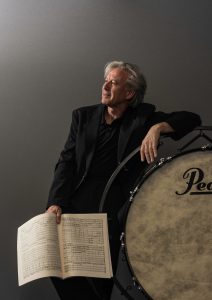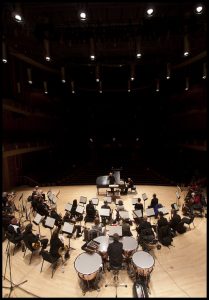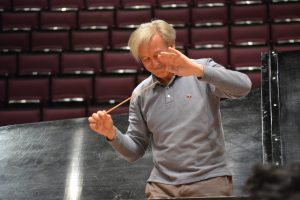Hitchcock and Herrmann, Howard and Horner, Spielberg and Williams: for every great filmmaker, there must be a great composer.
Dmitri Shostakovich may be a household name to classical music lovers, but before the Russian pianist and composer’s symphonic career took off, he was a young artist collaborating with an up-and-coming filmmaker named Grigori Kozintsev. Their first big film project together—a tale of star-crossed lovers torn apart by a revolution that rocked the world—was “The New Babylon,” the 1929 silent movie with an eclectic original score that was recovered after being lost for decades.

And it is about to be revived in a wonderful way at the AFI Silver Theatre in Silver Spring, where the audience will see the original silent movie while live musicians perform. “Instead of just showing the film, I will be conducting the ensemble, performing live, synchronized with the film,” explained conductor Angel Gil-Ordoñez, who, in a collaboration of his own, founded PostClassical Ensemble (PCE) with Joseph Horowitz in 2003. The Ensemble-in-Residence at the Washington National Cathedral, PCE has taken on the challenge of rethinking the way audiences approach classical music by presenting concerts in exciting new ways to elevate the listening experience.
Born in Spain, Gil-Ordoñez is a world-renowned conductor, a professor and music director at Georgetown University, and a recipient of both the Royal Order of Isabella the Catholic (Spain’s highest civilian honor) and a WAMMIE (Washington Area Music Award) for classical music. He sees this project as a way to attract fans of classic cinema as well as classical music, while illuminating Shostakovitch’s originality and versatility.
“The guy was 22 years old,” he said, noting that the “New Babylon” score foreshadows the incredible body of work Shostakovich would spend the next half-century putting forward. “For this specific film, they were experimenting, and there is so much freedom.”
Freedom that Shostakovitch would later be denied as Josef Stalin came to power and artistic expression in the U.S.S.R. was curtailed. Over the course of a career that put him among the most important composers of the 20th century, Shostakovich divided critics inside the U.S.S.R. and around the world. Indeed, his score for “The New Babylon,” a tale of star-crossed lovers torn apart by a revolution that rocked the world, was savaged for being too complicated and too difficult to recreate.

“Its premise, the revolt—and the suppression of the revolt—of the Paris Commune in 1871 make it a perfectly relevant topic for the Soviets,” he said. “The way they express everything, the contrasts, are fantastic in both the film and the music. For example, while the laborers and workers are repressed by the soldiers, the Parisian bourgeoisie are in Versailles having the best time. All this juxtaposition of images makes it romantic and also political. Revolutionary.”
Dr. Olga Klimova, a visiting lecturer at University of Pittsburgh who specializes in Russian cinema, has been on hand as a subject matter consultant for this PCE project. “I’m interested in the connection between music and cinema,” said Klimova, who was born in Minsk. Kozintsev and Shostakovitch, she said, “made 11 films together. ‘The New Babylon’ was the first one, but both of them started, originally, with another film director, Leonid Trauberg. They were very young, Trauberg was 16 years old and Kozintsev, 19, when they started the Factory of the Eccentric Actors.” In this cutting-edge theater workshop, the two directors embraced everything eccentric; they trained stage actors in the latest methods and later, used the actors in their silent films.
Always interested in the avant garde and aware of new technologies in sound engineering, they engaged Shostakovitch. “They wanted someone talented, someone fresh,” said Klimova. “So, they went with Shostakovitch, who was 22 years old when they met him.”
The music, she said, wasn’t just added to the film—it was an intrinsic part of the story. And although the three young Factory of the Eccentric Actors artists would be collaborators off and on throughout their lives, this first film together was romantic, whimsical, youthful—and historical.

“There are two storylines,” Klimova said. “The historical part: revolution, action, tragedy and suffering. And the second layer of the film, the second narrative line, is about the two characters; one is the sales girl from this big department store, which is called New Babylon, and the soldier. So, Louise and Jean: they meet, they fall in love, and the whole film is based in history with this melodramatic love story.”
The film struggled to find its footing, and Shostakovich’s score was dismissed for its complexity and its reliance on outside influences (from “La Marseillaise” to “Can-Can” from Offenbach’s “Orpheus in the Underworld”) at a time when the Soviets were interested in simpler, more patriotic themes. The score was pared back and altered, Klimova said, in attempts to make it easier to play in movie houses. Rediscovered, it had its first live performance at London’s Barbican Centre last year. And now, Gil-Ordoñez is putting it together once again.
“It’s a nightmare,” he laughed. “Ninety minutes of synchronizing the music with the images is taking hours and hours.
“It’s very challenging,” he added. “But this is what’s exciting about PostClassical Ensemble. We’re always taking risks; this is why the audience is engaged. And the music is amazing.”
PostClassical Ensemble presents the D.C. area premiere of Shostakovich’s score performed live to a screening of the 1929 film “The New Babylon,” at AFI Silver Theatre and Cultural Center, 8633 Colesville Road, Silver Spring, at 8:30 p.m. Friday, March 30 and 2 p.m. Saturday, March 31. Tickets are $20, $18 for members and $10 for children. Call 301-495-6700 or visit www.postclassical.com.